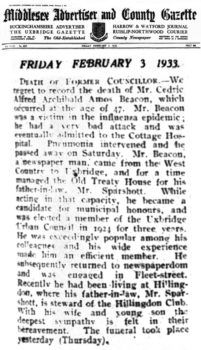My connection with the Beacon family is limited – my great aunt Maisie was briefly married to Cedric Alfred Beacon (1914-1922). Cedric and his father – Alfred Beacon, or Amos Beacon, or Dr. A. Beacon, or the “Rev. A. A. Beacon, Ph. D., M.A., etc.” are a puzzling and colorful pair, and I wanted to try and put together their story – or at least an outline of it. I believe that some part of their series of unusual transformations is upheaval that was going on in England at the time – a transformation in how children were educated in Alfred’s case and World War I and its aftermath in Cedric’s.
Cedric’s father Amos leaves you scratching your head. If census records are accurate (and this is all self-reported data, so it’s not always correct), a man who was a schoolmaster and for a while ran his own schools, in later life became a farmer, a green grocer and a timekeeper for a tram car company! How did that transition happen?
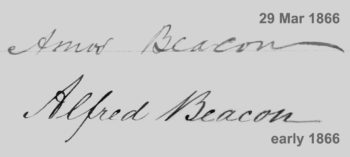
The name shifting Cedric and Alfred did was more than just having a nickname they were known by – a very common occurrence in many families at the time – and at first I wondered if they were trying to hide something, but I found no stories of multiple wives at one time, debt or fraud. However, Cedric and his Dad appear to have been willing to fudge names, birthdates, qualifications and occupations as and when needed.
It appears that Amos, with one exception in the 1861 census where he’s “Archer Beacon”, morphed into Alfred Beacon the teacher, but in 1866 he used both. The signatures above were written about the same time. Amos was on the legal document (parish register when he married Mary Ann Purkis) and Alfred was on the cover of his thesis for the mail-order Ph D/M A from the University of Rostock in Germany (more on that tale below).
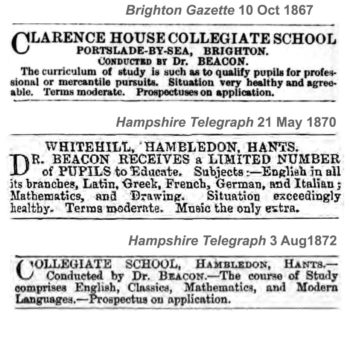
Newspaper ads for his private school ventures said “Conducted by Dr. Beacon”, and ran from July 1866 (when he didn’t yet have his mail order degree, but must have been anticipating it) through September 1874. It’s possible that the Brighton venture didn’t draw enough pupils (ads for just over one year and then he moved to Hambledon, Hampshire). Most of the reference letters/testimonials (from his granddaughter’s collection) just used the initial A – if you’re going to vary your first name(s), keeping the same initials makes life much simpler. C. A. Beacon covers both Charles Archibald and Cedric Alfred; A. Beacon covers both Amos and Alfred. Cedric muddied the waters to use Alfred and Amos on his wedding certificate and listing his occupation as “Clergyman” – Alfred was not ordained, but had been appointed a lay assistant by the Bishop of Exeter for the parish of Modbury, Devon. Listing him as “Rev. A. A. Beacon” in the newspaper announcement was likewise stretching the truth (but there’s no evidence of Amos ever referring to himself that way).
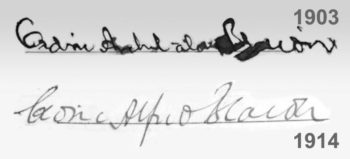
I still have many unanswered questions. For Cedric: why did he go from being an assistant librarian (1901 census, age 15) to enlisting in the Royal Field Artillery in January 1903 (saying he’s 19 years 8 months old)? Why, having extended his commitment, did he buy his way out of the military (he had switched to the Army Ordnance Corps in 1905) in 1913? Where did he get the money from (it cost him £18, about £2,000 today)? He represented himself (son’s birth certificate in 1925 and grandchildren’s memories) as a journalist, but I haven’t found anything outside of the brief stint as assistant advertising manager at the Hampshire Post that connects him to a newspaper.
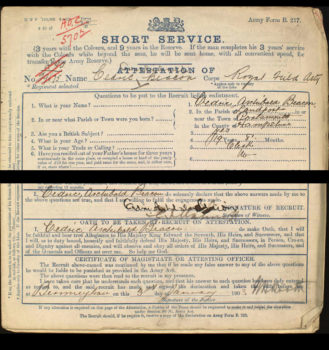
I haven’t found a will for Alfred, but I’m guessing that there wasn’t much money to leave to his widow, Bessie, when he died in 1907, let alone his oldest son. Cedric must have thought the Army was a way to make a living for himself when there weren’t any other obvious prospects. In 1903 his father had given up trying to run a school (1901 census has Alfred Beacon as a Tram Inspector), so there was no “family business” to slide into. The Boer war had ended in May 1902, but there were several newspaper articles from 1900 to 1903 about issues with declining numbers of army recruits and the possibility of conscription. I thought that might have resulted in enlistment bonuses, but couldn’t find more than discussions about increasing pay might help with recruiting (duh!)
We do know Cedric had good teeth! An article in the Yorkshire Post in March 1903 mentioned that in 1902, just over 5% of would-be army enlistees were rejected for bad teeth, double the number in 1901. There was also an article in 1903 about issues with under age soldiers (18 was the minimum to sign up and 19 to serve overseas) and parliamentary debate as to whether a birth certificate should be required (it wasn’t; civil registration of births had only started in 1836 and wasn’t compulsory -£2 fine if you didn’t – until 1875; many would not have had a copy of their own birth certificate in those days). In this incarnation, Charles Archibald became Cedric Archibald – step one complete!
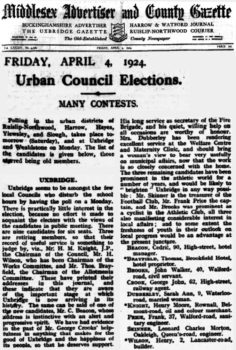 In Cedric’s second marriage (in 1922 when the ink on the divorce papers was barely dry) he stuck with Cedric Alfred and became involved with local civic life, including a stint on the Uxbridge Urban District Council from 1924-26. His new father-in-law, Walter Sparshott, was the license holder for the Old Treaty House in Uxbridge, and for a while Cedric managed that for him as well. The newspaper account of the results noted there was a 20% turnout for that election!
In Cedric’s second marriage (in 1922 when the ink on the divorce papers was barely dry) he stuck with Cedric Alfred and became involved with local civic life, including a stint on the Uxbridge Urban District Council from 1924-26. His new father-in-law, Walter Sparshott, was the license holder for the Old Treaty House in Uxbridge, and for a while Cedric managed that for him as well. The newspaper account of the results noted there was a 20% turnout for that election!
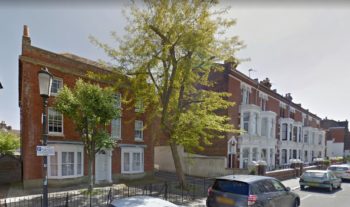
For Alfred I think the path to and from schoolmaster is caught up in a huge transformation underway in education while he was trying to earn a living within changing rules and expectations, both legal (a series of Education Acts) and marketplace – the sort of schooling the middle and working classes wanted for their children. The first teaching job Alfred Beacon had (that I know of) was working for Mr. Mark E Frost at Southsea House in Portsmouth, Hampshire (~1858 to 1866). This picture is of Castle Road across the street from where Southsea house was (it’s now two modern buildings sandwiched between the original victorian terraced houses). This, and the short list of boys’ names in the 1861 census for Southsea House, show clearly how small a school it was – like many private schools of the time.
As part of trying to tease out Alfred’s story, I learned a lot about the changes in England in the mid- to late-1800s with public education. Who got to teach, who paid for it and all the different reasons various groups had to object to moving towards a system of universal public education for English children – the idea of a secular education upset the leaders of the Church of England, for example. The slow process of building an education system included some amazingly low standards – by 2018 expectations – with the 1862 legislation; an 1870 Education Act that provided money for elementary schools where there weren’t any in place; and in 1880, finally, compulsory education, but only for 5 to 10 year olds.
After Alfred Beacon left Mark Frost’s Southsea House, he appeared to start several of his own schools – based on advertisements in the Brighton and Hambledon newspapers from 1866 to 1874. Clarence House Collegiate School, Whitehill School, Collegiate School were the names and “Dr. Beacon” was the master. His granddaughter has a copy of his doctoral thesis from the University of Rostock (Germany), dated 1866, and that opened up another interesting tangent on the granting of doctorates by a number of German Universities – all legitimate – for non-resident students. It became a scandal if the newspaper stories are to be believed and there was a move towards trying to clean up qualifications claims – such as having to specify where your doctorate came from – and to stop universities for granting doctorates without an in-person defense of the thesis.
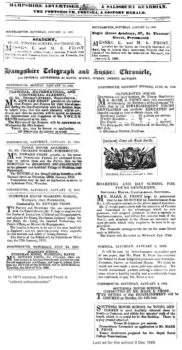
It may be that a combination of things – competition from larger schools, increased regulation, difficulties with his German PhD being accepted – led Alfred Beacon to give up trying to run his own school. He wasn’t the only one to move on from that business. Mark Frost of Southsea House stopped in 1866 as well (possibly because his schoolmaster left?) and then went on to be a coal merchant and proprietor of the Landport & Southsea Steam Laundry! Mark Frost’s older brother Edward (with whom he’d run a school from 1839 – 1842) had been running his own schools until 1869 and then he became the agent for National Loan Fund Life Assurance and by the 1871 census was listed as a retired schoolmaster. The private school business wasn’t what it used to be…
The farm in Chute Forest, Wiltshire is a surprising choice for a new career for Alfred Beacon – you have to wonder if he knew anything about farming at all. His wife died in 1880; in 1884 he helped out a relative, Charles Purkis, by teaching for him at Beaminster Grammar School when Purkis’ wife died. In 1885 he was a private residential tutor in Winchester and in November of that year he marries again. When his first child is born in April 1886, the address on the birth certificate is that for a Civil Service Training School, suggesting he continued teaching but as an employee, not an owner.
When the next child is born in 1888, Alfred is in Sparkhill and is a green grocer; in 1891 he’s a tramway time keeper; in 1893 (another child’s birth certificate) he’s a Timekeeper and in the 1901 census a Tram Inspector in Kings Norton.
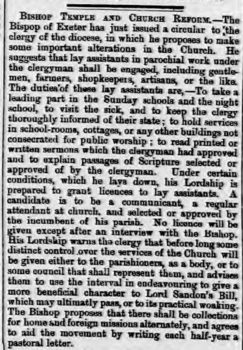
Referring to Alfred Beacon as Reverend may be an invention of Cedric’s, not something Amos/Alfred ever claimed for himself. He was made a lay assistant for the parish of Modbury in Devon by the Bishop of Exeter, Frederick Temple (who had a major drive to increase laity involvement by appointing lay assistants). This is not the same as being an ordained minister and allows certain tasks to be undertaken under the Vicar’s supervision, for that parish only, and with prior approval by the Vicar. A few people did this work full time – I found one ad for a man licensed in two parishes who was seeking paid work as a lay assistant. I have no idea if Alfred Beacon ever did this.
![]() Cedric wins in the name sweepstakes. His birth certificate says Charles Archibald Beacon, his first enlistment was as Cedric Archibald Beacon, his first marriage and second enlistment was as Cedric Alfred Beacon, and his death certificate Cedric Alfred Archibald Amos Beacon! I don’t think he ever used Amos, but his widow, Nora, left out Charles and added Amos. The more the merrier!
Cedric wins in the name sweepstakes. His birth certificate says Charles Archibald Beacon, his first enlistment was as Cedric Archibald Beacon, his first marriage and second enlistment was as Cedric Alfred Beacon, and his death certificate Cedric Alfred Archibald Amos Beacon! I don’t think he ever used Amos, but his widow, Nora, left out Charles and added Amos. The more the merrier!

